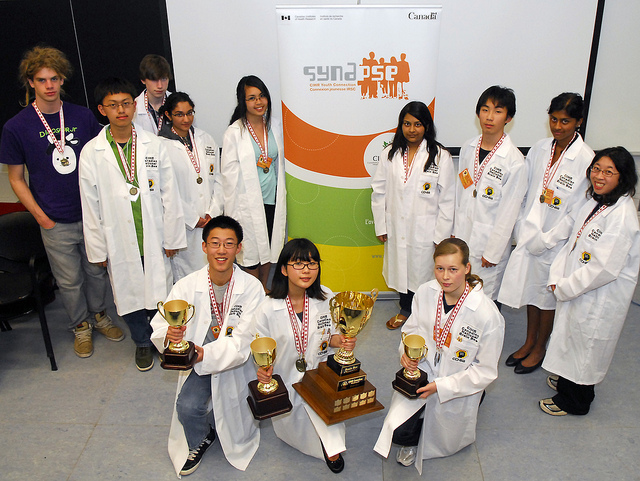Third Annual Competition, May 29, McMaster University
Find more photos here: 2010 CCNBB Flickr Photos
We have our top three winners!
1st Place: Linda Zhu, Centennial Collegiate Vocational Institute, representing Guelph Brain Bee
2nd Place: Kerry Sun, Old Scona Academic School, representing Edmonton Brain Bee
3rd Place: Elena Mamycheva, York Memorial Collegiate Institute, representing Toronto Brain Bee
Congratulations to all our competitors for a very well played day, we are proud of everyone!
The twelve 2010 regional champions were (alphabetically by first name):
- Elena Mamycheva, York Memorial Collegiate Institute, representing Toronto, Ontario
- Isuri Herath, Lisgar Collegiate Institute, representing Ottawa, Ontario
- Jodeci Malixi, MacDonald High School, representing Montreal, Quebec
- Kerry Sun, Old Scona Academic School, representing Edmonton, Alberta
- Linda Zhu, Centennial Collegiate Vocational Institute, representing Guelph, Ontario
- Ling-Sang Tse, Earl Haig Secondary School, representing Waterloo, Ontario
- Lucas Sweetland, Carbonear Collegiate, representing St. John’s, Newfoundland
- Maria Seraj, Bishop Ryan Catholic Secondary School, representing Hamilton, Ontario
- Nick O’Leary, Prince Andrew High School, representing Halifax, Nova Scotia
- Parnian Riaz, Peace River High School, representing Calgary, Alberta
- Pei Jun Zhao, London Central Secondary School, representing London, Ontario
- Yesha Ouyang, Fraser Heights Secondary School, representing Vancouver, British Columbia
Dr. Judith Shedden, an Associate Professor in PNB, is the Chair of the CIHR Canadian National Brain Bee Committee. Shedden stated, “An important goal of the Brain Bee is to reach out to our extended communities to share what we are doing in our laboratories, and to encourage these bright young minds to consider a career in brain research.”
It appears to be paying off. Many Brain Bee competitors and winners have gone on to careers in medicine and neuroscience.
“The Brain Bee laid the foundation,” says Sanket Ullal, who is starting his fourth year in Biology at McMaster. “The knowledge and inspiration I gained from competing in the Brain Bee has given me an edge in research and school projects.”
Ayan Dey is starting his fourth year in the Psychology and Neuroscience program. “The brain bee was my first real exposure to the field of neuroscience and I’ve been hooked ever since. It is the reason I’m currently in the neuroscience program here at McMaster – a decision I definitely do not regret.”
Sean Amodeo, who won the Toronto regional brain bee and was the first place champion in the 2009 CIHR Canadian National Brain Bee, is in his first year in Health Sciences at McMaster, and says “the Brain Bee represented an opportunity to learn about one of the most rapidly growing areas of science. The brain bee inspired my interest in neuroscience and led to my goal to pursue a career in brain research.”
The CIHR Canadian National Brain Bee is supported nationally by the Canadian Institute of Health Research (CIHR). “Again this year, CIHR is proud to sponsor the third annual CIHR Canadian National Brain Bee,” said Dr. Anthony Phillips, Scientific Director at the CIHR Institute of Neurosciences, Menta lHealth and Addiction. “This championship allows the brightest students in Canada to gather and measure their knowledge about the brain, the most complex structure in the known universe. It is essential for CIHR to encourage these talented students to get involved in science, since they represent the future in this field.”
The McMaster team of volunteers, led by local organizers Dr. Judith Shedden, Dr. Joe Kim, Chris McAllister, Matt Pachai, and Katherine Holshausen includes staff, students, and faculty from the Department of Psychology,Neuroscience & Behaviour (PNB) and the McMaster Institute for Neuroscience Discovery and Study (MiNDS), and with support from the McMaster Faculty of Science. Critical to the success of the national brain bee is the generous donation of hours and resources from the Centre for Simulation-Based Learning at McMaster (patient diagnosis test: Brad High), and the McMaster Educational Program in Anatomy (neuroanatomy bell-ringer exam: Dr. Alexander Ball and Dr. Laurie Doering).

